In April, between Mardi Gras and Jazz Fest, the place to be is the New Orleans Poetry Festival. Like some people put family reunions or sci-fi conventions on their calendars a year ahead of time, I plan on going to NOLA in April. My first time was also the first year of the festival, and it coincided with Lavender Ink’s publishing of one of my books. It was serendipitous, and I got hooked. Last year I didn’t think I would make it because my dog was dying. But on a day in April, in between specialist vet appointments, I learned that Marthe Reed had died. Many were gathering at the festival to remember and celebrate her life and work, and I wanted to be there too, with others for whom she was so important as a poet and person in the world.
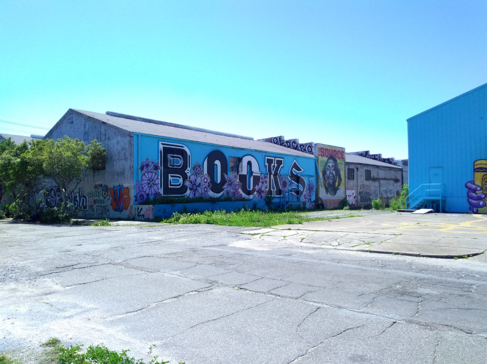
I don’t know how to explain the feeling, but I know that others who have gone to the festival seem to recognize it. It’s not like other conferences or academic events, and many who attend don’t work in higher ed. Everyone is there to listen to writing, think about writing, and talk to writers in ways that feel more like fun than obligation or responsibility. It’s mostly poetry, which I love, but also includes readings and talks about fiction and essays, music, performance, non-English perspectives on the world, and more. Many of the writers and their work lean toward the innovative, but it’s also a space wide open to any creative leanings and all kinds of diversity; at least I perceive it to be and hope that it is. And it’s small, the events accessible, it feels comfortable. I go to a lot of conferences, and I like going to them, but I rarely feel comfortable. I don’t really go to AWP because I get a kind of anxiety just thinking about trying to navigate it; in my mind it feels the opposite of comfortable.
Because so much of the festival is about building and maintaining community and learning from one another--and for me it’s about being with other writers, hanging around, and soaking it all in, in a low-stakes and organic kind of way--I offer here a few highlights from my own experience at this year’s festival, and some that others have shared about what stood out for them.
The opening event, a special Dogfish Series reading with Henk Rossouw, Chen Chen, Oliver Baez Bendorf, and Lee Ann Brown, created a space nestled within Jessica Kinnison’s home venue to share perspectives, experiences, lives, and language. From the racial tensions and complex histories of South Africa and Louisiana, to the intricate layerings of identity, gender, narrative and navigating one’s way through the world, the readers brought us in, and held us in a moment of respite and reflection. Although the writers’ style and content seemed dramatically different from one to the next, the work resonated across lines in many ways, and especially in how poetry and other kinds of perceptive writing can call us to listen beyond our assumptions and expectations, to see others not as distant foreigners but as fellow humans in need of compassion and care.
The Friday international feature event filled the space with Portuguese, Spanish, French, and English; a musical dialogue of feeling affected by at least one poet’s absence: she was denied a visa due to Trumpian border policies. Poets Salgado Maranhão and Javier Etchevarren read their poems in the original Portuguese and Spanish and their translators read the English. Jesse Lee Kercheval and Mark Statman shared their translations of poems by Uruguayan poets from books published by Lavender Ink/Diálogos. The relationships between poets and translators were keenly felt, especially since they often work on multiple projects over long periods of time.
Saturday night was a celebration of word, rhythm, and musical action with performances by Kalamu Ya Salaam, and Anne Waldman with Fast Speaking Music. Salaam is a local New Orleans Black Arts writer and activist who’s published poetry, music reviews, cultural and political essays, and other kinds of work. His performances, like his politics, engage the audience and bring people in to work together, to create a communal space of action and energy and tender the hope for a better world. Audience participation in the performance further brought the poetry to life. Waldman, along with Devin Brahja Waldman, & Janice Lowe kept us on the musical magical carpet ride of poetry with their jazz riffs and language play. Waldman has a long bio and is an ardent social and cultural activist; living in both NYC and Boulder, CO and traveling extensively, she seems most at home on the stage where her poems and the accompanying music become one, making the words resonate and linger.
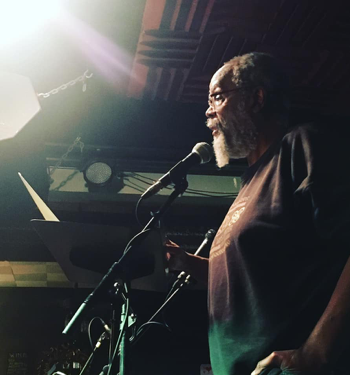
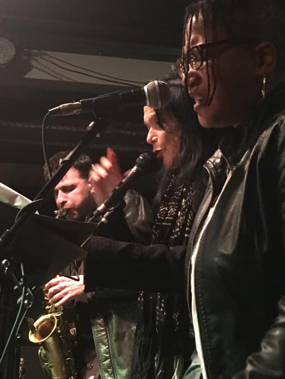
Ariella Ruth Goldberg told me that the Anne Waldman and Fast Speaking music event was a key moment, especially since it followed a Second Line musical parade down St. Claude Ave. to the poetry music venue. Reflecting on the festival, Jonathan Penton explained, “Megan and Bill organized a second line for the poets we’ve lost over the past year, and I was honored to read a poem by Felino A. Soriano, “Stilled, and then the memory shapes fruition,” which he wrote for our dear friend Michelle Greenblatt.” Penton participated in a number of events, including the panel “Poets and Publishing” with Rosalyn Spencer and others, “in which organizer Jeff Weddle kindly invited us to speak. We spoke with three mimeograph historians, and got to discuss the technological changes of “outsider” literature over the 20th and 21st Centuries.” The festival, Goldberg said, “was exactly the boost of creative energy and connection that I needed, and ... a great reminder to prioritize writing in my life.”
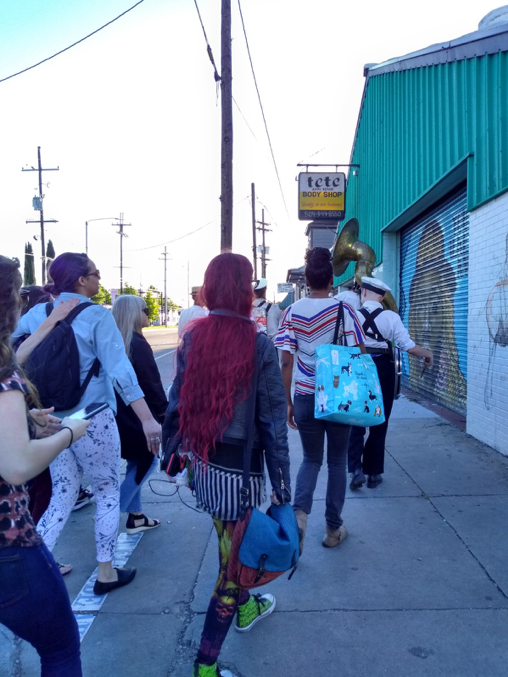
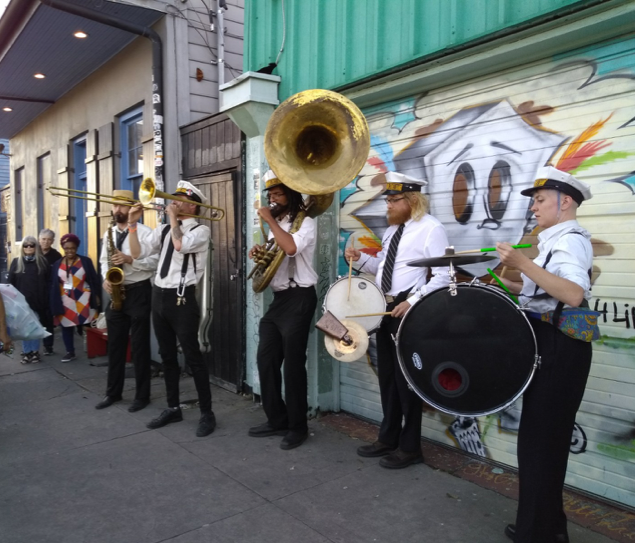
There are always more panels and talks than one can get to, and they are filled with imaginative, educational, and inspirational insights that often go beyond traditional ideas about poetry or poetics. The Panel, “Catastrophe to Courage: Poets Push the Essay,” included presentations by Ching-In Chen, Dana Teen Lomax, and others who spoke as poets using essay forms to write through questions and catastrophes. Chen read from the essay “Saying My Name with Happiness” included in the collection, How Dare We! Write: A Multicultural Creative Writing Discourse. In the essay, Chen reflects on growing up Asian American and shows the importance of investing in thoughtful writing and pedagogy that center diverse multilingual and multicultural perspectives and approaches in our writing classrooms. Lomax shared an essay inspired by her own questioning of white privilege and teaching history and racial justice to predominantly white junior high students in California.
Chen later told me, “this is the second NOPF I attended and what I most appreciate is the sense of space given for conversation, listening and connection. A highlight was the crawfish boil that Tiana Nobile, who is one of the chairs of our Kundiman South regional group, hosted as a Kundiman salon. We told stories, peeled and ate and laughed … I would come again to the festival.”
In “Raced, Not Erased: Ghosts in Favor of Critical Theory” panelists Joseph Earl Thomas, Muriel Leung, and Rosana Cruz spoke about multi-genre approaches to writing race and diversity into their work. Reflecting on how race functions in fiction and other writing in relation to historical and contemporary erasures and misrepresentations, they drew on examples from Gayatri Spivak’s “Can the Subaltern Speak,” Saidiya Hartman, and Octavia Butler, among others. Genres like speculative and futuristic fiction, Afrofuturism, and magical realism, especially, offer opportunities to comment on the present by writing through ghosts of the past.
I first met C.S. Carrier at the festival in 2016. Then and every year since, Carrier and a group of students load up into a van, and drive from Arkansas to NOLA for poetry. Carrier told me that highlights this year included “WITH WAVES, a collaborative performance hosted by Red Rover Series” because “it felt free and celebratory. It felt like a conversation, a genuine and fun and hopeful conversation. It felt necessary. I appreciated the format and ways in which the participants engaged.” Also important for Carrier was the “Reading & Dusie Kollektiv Chapbook exchange in Tribute to Marthe Reed.” Carrier explains:
… Marthe was and continues to be a huge force for me. And it was a privilege to celebrate her awesomeness in general, but also with others in particular. And the Dusie collective, which I have such respect for.
Beyond these two, and this is broad, I enjoyed the time I spent with my friends, both new and old. There aren’t many poets in my everyday life in Arkansas. Also a key experience: traveling there with my students … Watching some of them engage in the NOPF context was fairly rewarding. Having them sit in the back of the van challenging each other with writing prompts then sharing and discussing their responses (all of which seemed to be informed by their encounter with NOPF) was fairly rewarding too.
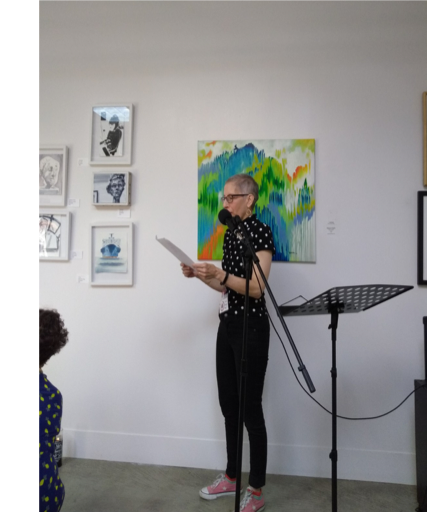
I appreciate the emphasis on readings and panels that are less normative in subject matter and structure. I appreciate its inclusivity and diversity. I appreciate the connections/relationships I’ve made there. And those that I imagine I will continue make.
Organized by Megan Burns, Bill Lavender, and a group of volunteers, the festival brings poets and other writers together, for a few short days, to listen, celebrate, and share. This event seems a natural product of the work that Burns and Lavender do as writers invested in communities of poetry, from their locally run poetry presses to all kinds of other projects. Kenning Jean-Paul García captures so much of the feeling of the festival, as I also relate to it, and gave me permission to include that reflection here, originally posted on Facebook:
Every person I sat next to on my panels were beautiful, humble geniuses … I walked away feeling seen, recognized, and a bit revived despite the hangover ... When people talk about a literary community this is what they mean. There were some very tender moments sitting down and just talking with people. On one hand I don't see many of these folks enough and on the other hand we know each other well or are at least trying to. We are our writing and we're more than that. I hope to see everybody again sooner than later maybe in your hometown or maybe in mine or at the next conference/event that calls us to be present.
I imagine I’ll be in NOLA again next year for many reasons, and especially because it’s where I can feel the sometimes disparate parts of my writer-self come together. As a teacher, poet, academic/other writer, union member, social activist, partner, and dog mom (to a newly adopted anxious, sweet, and furry six-year-old), it can be hard to keep these in sync at any given time. And that’s why, at least in part, finding spaces of emotional, intellectual, social, and creative connection and engagement are so important. Of course, not everyone can make it to NOLA, and even when we do, it’s only for a few days. And so lately, I’ve also been thinking more about local writing communities and how to develop those where I live and work, to keep the feeling of the poetry festival closer and ongoing. If you do make it to NOLA next year, I hope to see you there, and if not there, somewhere.
Jill Darling has published poetry, fiction, and creative and critical essays. Her books include (re)iterations, a geography of syntax, Solve For, and begin with may: a series of moments as well as two collaborative chapbooks with Laura Wetherington and Hannah Ensor: at the intersection of 3, and The First Steps are the Deepest. Darling teaches writing at the University of Michigan in Dearborn and Ann Arbor. More info and links to work online can be found at jilldarling.com.

